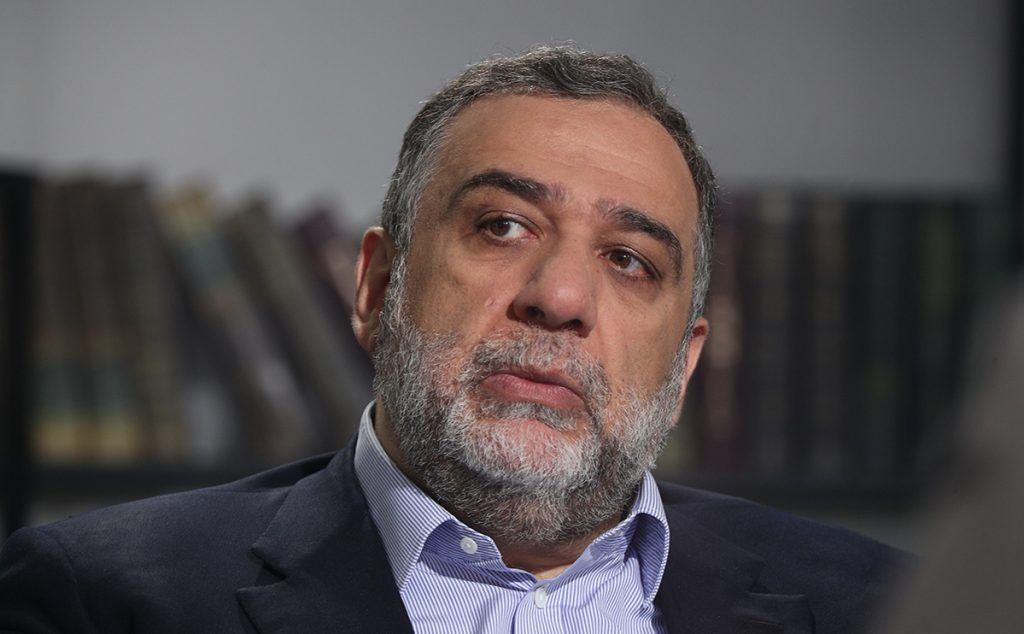A new candidate is making waves in the Democratic primaries: nobody. Organizers had urged Democrats to vote "uncommitted" in the Michigan primary on Tuesday, a way to show President Joe Biden that his foreign policy risked losing a crucial swing state. Around 13 percent of Democratic primary voters did, exceeding organizers' expectations.
The campaign was led by Arab Americans angry with U.S. military involvement in Gaza and Yemen. Other voters were motivated by a lesser-known side of Biden's foreign policy: The Armenian National Committee of America (ANCA) also campaigned for uncommitted votes in order to protest Biden's support for Armenia's enemy Azerbaijan.
"We didn't deliver the bulk of those votes, clearly, but we were part of it, and we were happy to be a part of it," says Aram Hamparian, executive director of ANCA. Armenians are looking to organize similar campaigns in Nevada and Pennsylvania, two other swing states with robust diaspora communities, according to Hamparian.
The U.S. Census counts 17,000 Armenian Americans in Michigan, although it may be an undercount, as the Armenian Community Center in Dearborn says that there are 50,000 Armenian Americans in the state. Both the Armenian and Arab communities in the state date back more than a century.
The Armenian uncommitted campaign went public on February 20, when ANCA board member Dzovinar Hatsakordzian published an op-ed in The Armenian Weekly announcing that she would vote "uncommitted" in the Michigan primary.
"I was surprised with the reaction of the community," Hatsakordzian tells Reason. "When we started, we didn't think that they would be open to the idea, but [the support] was overwhelming."
Armenian Americans "tend to align along with the area they live in" in terms of party politics, but "they'll cross a party line if they feel like there's a very stark issue before them," Hamparian says. "The military aid to Azerbaijan is our chief complaint about Biden."
In September 2023, the Azerbaijani military stormed the Armenian-majority territory of Nagorno-Karabakh, driving out almost the entire population, an act that many outside observers have called ethnic cleansing or even genocide. It was the ugly coda to a long, brutal conflict between Armenia and Azerbaijan.
During the collapse of the Soviet Union, the Armenians of Nagorno-Karabakh had attempted to declare their independence from Azerbaijan, leading to a war that involved atrocities and mass displacement on both sides. (The territory is also called Artsakh in Armenian.) The conflict froze in the mid-1990s and restarted with an Azerbaijani offensive in September 2020.
"If they do not leave our lands of their own free will, we will chase them away like dogs and we are doing that," Azerbaijani President Ilham Aliyev said in an October 2020 speech. Aliyev also stated that he would welcome Nagorno-Karabakh's Armenians as fellow citizens, a claim that Armenians were inclined to disbelieve after Azerbaijani troops beheaded two elderly Armenian men on camera.
Azerbaijan's wars have been funded, in part, by the American taxpayer. Congress initially tried to stay out of the conflict, banning military aid to Azerbaijan in 1992. A decade later, the U.S. government reversed course, hoping to gain a new strategic ally, because Azerbaijan is located between Iran and Russia and along key air routes to Afghanistan.
Every president since George W. Bush has waived the congressional aid restrictions, and Washington provided $164 million in "security assistance" to the Azerbaijani military between 2002 and 2020. Most of that aid, over $100 million, came during Donald Trump's presidency.
After the 2020 offensive, then-candidate Biden demanded an end to the aid. But after he took office, Biden continued to sign off on the security assistance programs.
"The bulk of military aid to Azerbaijan went under Trump, and the [2020 offensive] took place in the last months of Trump's presidency, so he bears heavy responsibility for that," Hamparian says, but "having witnessed the war, [Biden] continued the military aid."
There was a particularly strong sense of whiplash within the Armenian-American community in April 2021. That month, Biden recognized the World War I–era mass murder of Armenians in Turkey as a genocide, a move that Armenian Americans have long called for. A few days later, Biden went back on his campaign promise and approved additional aid to Azerbaijan.
The Biden administration announced its genocide recognition with massive media fanfare, while it quietly notified Congress about the military aid. Biden was behaving "as if somehow Armenians will not notice that he's arming a genocidal state in the same week that he's recognizing a genocidal crime," Hamparian says.
U.S. military aid, which mostly focuses on border security, is not a make-or-break issue for the Azerbaijani army. Between 2010 and 2020, the majority of Azerbaijan's weapons came from Russia, with smaller contributions from Israel, Belarus, and Turkey. Russia also supplied nearly all of Armenia's weapons in the same period.
In addition to selling weapons to both sides, Russia has had peacekeepers in Nagorno-Karabakh since November 2020. Those troops have largely not acted to protect the local population.
However small U.S. aid was in the grand scheme of things, Hamparian believes that the very existence of that aid was "morally emboldening" to Azerbaijani leaders, who thought they had an American green light.
Then came the starvation siege. In late 2022 and early 2023, the Azerbaijani army gradually cut off Nagorno-Karabakh's access to the outside world. Severe shortages set in. Azerbaijan was even rumored to be building a concentration camp for Armenian men, a rumor that New Lines journalists were able to corroborate using satellite imagery.
Her voice filled with emotion, Hatsakordzian describes the Armenian-American message to the Biden administration at the time: "We went to them, and we said we know this is going to end with ethnic cleansing…Why is my taxpayer money going to fund a genocidal country such as Azerbaijan?"
Those fears came true in September 2023, when the Azerbaijani army overran the territory, leading to a mass Armenian exodus. The Biden administration then paused military aid to Azerbaijan, and the Senate moved to make it a two-year suspension. At the time, Hamparian called Washington's actions "a day late and a dollar short."
Hatsakordzian says that she does not currently plan to vote for Biden, and that in order to win back her vote, "he can sanction Azerbaijan, he can stop sending weapons to Azerbaijan, and take concrete actions to stop the genocide that is going on."
Some Armenian Americans also sympathize with Arab Americans' campaign against the Biden administration.
The two campaigns "share the exact same frustrations" with U.S. foreign policy, says Sarah Leah Whitson, executive director of Democracy in the Arab World Now, a Washington-based nonprofit. She is an Armenian American whose own family escaped to Jerusalem in the wake of the Armenian genocide, before fleeing again due to the Israeli-Palestinian conflict.
Whitson compares Armenian-American grievances with U.S. support for Azerbaijan to Palestinian-American grievances with U.S. support for Israel: "You have a strong diaspora community that's deeply opposed to an abusive regime, and they find their own government supporting it."
ANCA has been more circumspect about its stance on the Israeli-Palestinian conflict. Hatsakordzian and Hamparian emphasize that Armenians have good relations with their Arab and Jewish neighbors alike. Yet Hamparian supports, on principle, the other efforts to pressure the Biden administration in the primaries.
"Everyone who voted 'uncommitted' went to the polls trying to bring accountability to our foreign policy system, and that's a good thing," Hamparian says. "Exercises like this remind [politicians] that foreign policy doesn't start and end at the State Department. It's the property of the American people."
https://reason.com/2...es-to-michigan/














